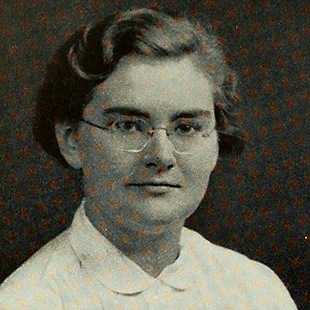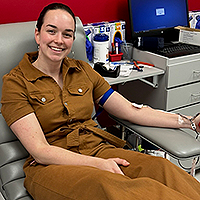Women’s History and Impact on Sickle Cell Anemia
Caroline White
March 13, 2024
Caroline White
March 13, 2024
“Women’s History is a right – an essential, indispensable heritage from which we can draw pride, comfort, courage, and long-range vision.” – Gerda Lerner
American society celebrates Women’s History Month every March and the world celebrates International Women’s Day on March 8. This month is a time to highlight the contributions of women throughout our history.
This Women’s History Month, OneBlood is focusing on Dr. Helen Ranney, an American scientist who made groundbreaking contributions to the field of blood science.

Dr. Helen Ranney (1920 – 2010)
Dr. Helen Ranney was a pioneer of sickle cell research. Sickle cell disease is a blood disorder where hemoglobin, the part of our red blood cells that transports oxygen through our bodies, forms irregular shapes. These different shapes can cause blockage, disease, and strokes in sickle cell patients.
By developing a way to look at the shape of hemoglobin, Dr. Ranney was able to distinguish between the blood cell shapes of people with the sickle cell trait and those without. Through her research it was discovered that there is a genetic component to sickle cell anemia.
Sickle cell is now known to impact African Americans at a notably higher rate than people of other ethnic backgrounds – 1 in every 365 babies are born with sickle cell anemia and 1 in every 13 babies are born with the sickle cell trait.
Because of Dr. Ranney’s research, we understand that African American blood donors are crucial to the treatment of sickle cell patients. 1 in every 2 African Americans are a blood match for sickle cell patients! The need is real. Sickle cell patients frequently require blood transfusions throughout their lives and knowledge of the genetics behind the disease is pivotal to its treatment.
To celebrate Women’s History Month, think about other influential women in history. Where would our society be without them? Thanks to women scientists like Dr. Helen Ranney, thousands of lives have been saved. You can also save lives by donating blood in honor of the influential women in your life!
Check out some Women’s History Month facts that show the past is not far away from the present:

Caroline White is a OneBlood Digital Marketing Specialist. Caroline is an active OneBlood O- donor who is passionate about the power of digital social spaces and encouraging others to donate.